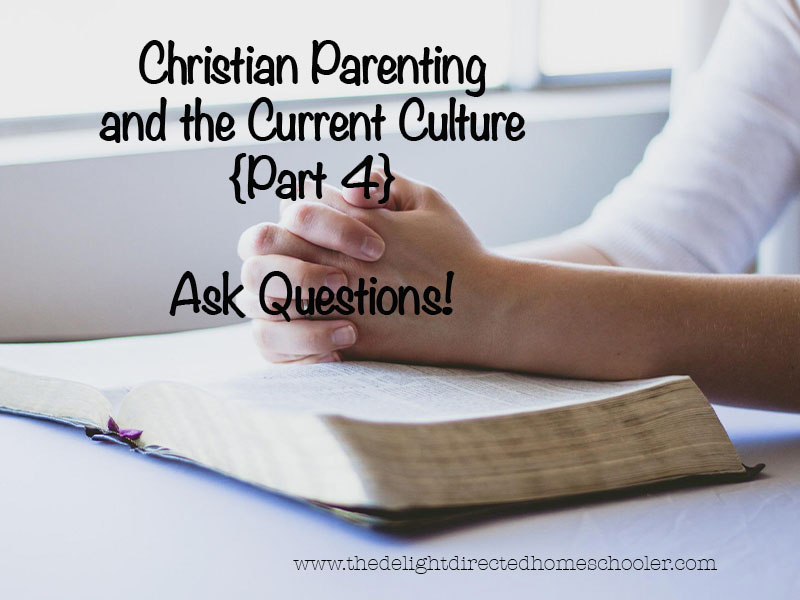Did you know that teens like to stay up late and have deep talks? Like… you are with them all day and open for conversation, but it isn’t until you are getting ready to head to bed that they come out seeking wisdom and depth. In the past week, our seventeen year old has tackled the subject of women’s roles according to the Bible, why a good God allows bad things to happen, and was is God that hardened Pharoah’s heart or was it already hardened?
We’ve had a tough summer around here. We experienced deep hurt from our local church. Church hurt hurts deeply and is very messy. We are clinging to the promise of Romans 8:28:
And we know that for those who love God all things work together for good, for those who are called according to his purpose.
Sometimes, things just don’t make sense. Sometimes things are just hard and we don’t know why. But there is the promise that God is working in all things. He is sovereign and he is in it with us and will see it to completion. I have been frustrated over what’s happened with our family because I know that it is affecting my children and stirring up things. Where I have been worried it will cause my oldest to walk away from all things church and faith related, it has actually brought these deep and thoughtful questions… late at night… when I’m heading to bed.
I am a question asker. I learn and process through asking questions. This has been a practice in which I am trying to grow. One thing I’ve learned about myself is that I am a slow processor. Too often, I am quick to accept what’s happening around me and do not realize until later that I should have asked more questions or pressed in a little further to gain understanding.
An example of this has to do with the position I took as co- director for a large co op last year. I jumped in and started helping without fully realizing what I was getting into. Because I didn’t ask questions, I didn’t realize all that was going to be expected of me…. or all that I was going to need to expect from our teachers and students. I am one year into this position and still realizing questions I should have asked. It’s ok… it’s been a learning experience and I think, for the most part, a good thing. I’ve learned that one of my weaknesses is impulse and not thinking things through… then being surprised when I am overwhelmed. Does that make sense?
I’ve been learning for the last few years to ask questions in order to gain clarification. To ask questions to challenge and seek truth. To ask questions to dig in and get to the heart of an issue.
But guess what… not everyone likes questions. We live in an age where we want our information fed to us with minimal effort. If an article is too long and doesn’t have enough pictures, we keep on scrolling (congrats to you if you’ve made it this far!). If a book isn’t exciting enough or short enough or easy enough, we don’t even try. If a YouTube tutorial is too long or seems to complex, we move on to the next one. We want other people to do the hard work of learning something and then for them to just give it to us in the most concise and easy way possible. Asking questions and learning to gather information for ourselves is a dying art (in my opinion).
As I am learning to ask questions, I want to teach my children to do so. I don’t want to teach them to ask questions just for asking’s sake. I don’t want them to be combative or never accept an answer or assume that other people are always wrong. I want them to be critical thinkers. I want them to take in information and have a system in place to filter through… to know what to hold onto and what to let go of.

When my children were little and I was in a mom to mom group at our church, I remember one of the leaders talking about praying for our children. She mentioned their minds being like a colander and the prayer like water being poured over the contents of the colander. The prayer would be to wash away all the impurities and untruth that our children saw or heard that day (even if I as the parent was the one who said it) and all that would be left behind would be the nuggets of truth.
Mama Bear Apologetics teaches the Chew and Spit method:
“We don’t need to train our children to be picky when it comes to what they feed their bodies—they do this on their own. But we do have to train them to be discerning about what they feed their minds.”
This method teaches how to take in information with discernment- how to hold onto the good and get rid of the bad. The chew and spit method acknowledges that we are in the world and cannot get out of it… so we might as well learn how to navigate it. Check out THIS PODCAST for more information.
As I learn to ask questions and to ask my children questions, I want them to learn how to ask questions as well.

Did you know there is a whole method for asking deep, thoughtful questions? There is a method in which to teach critical thinking type questioning. It’s the Socratic Method.
Now… before you classical homeschoolers come at me… I’m not claiming to be an expert.. and chances are, I’m not going to explain it fully or correctly. So… please see the heart of what I am doing and the tools I’m try to share for having good conversations with your kids. With that said, here are some examples of questions you can ask your children and you can teach them to ask.
Clarifying Questions:
- What do you mean by…?
- Can you put that another way?
- How does this relate to what we are talking about?
Questions about the initial question or issue:
- Why is this question important?
- Why do you think that?
Assumption Questions:
- What can we assume about this question or issue?
- You seem to be assuming…?
- Why would someone make this assumption?
- Do I understand you correctly? (THIS IS A BIGGIE!!)
Reason and Evidence Questions:
- What would be an example?
- Why do you think this is true?
- What other information do you need?
- Why is this happening?
- Can you explain your reason?
- What led you to that belief?
Viewpoint Questions
- Who benefits from this?
- How would another group of people answer this?
- What is an alternative?
Implication and Consequence Questions:
- What effect would that have?
- Could that really happen or probably happen?
- What are the consequences of that assumption?
- What might someone who believes _____________ think?
- What is an alternative?

Teaching children to think critically about the information they are receiving is so important. I’m not interested in raising children who are critical and untrusting and assumptive… but I do want to raise children who are careful with the information they receive and run it through their filters.
We are Christians in our family. We believe in a triune God (The trinity- God the Father, God the Son, God the Holy Spirit). We believe that man is sinful. We believe that Jesus died on the cross to take the punishment for the sins of man. We believe that Jesus rose from the grave thus conquering sin and death. We believe the Bible is the inerrant Word of God… that is true and trustworthy. We believe that God is a promise maker and a promise keeper.
It is through the filter of those beliefs that we pour the information we take in on a daily basis. My oldest has been asking a lot of questions about women’s roles according to the Bible. He has been making assumptions based on his own personal, cultural lens. I have been challenging his assumptions and exhorting him to dig deeper and look into what the Bible actually says. I have asked about the consequences of his assumptions and tried to help him to carry a thought process through.
Asking questions is a good thing. It is a healthy thing. Our children, growing up in this increasingly hostile to Christians world, need to be able to think critically. They need to be able to recognize when a thought process or teaching is unhealthy and have a system in place for discernment. They need a filter. They need a lens. They need Jesus.
The dinner table and car are both great places to engage in conversation with your kids. Captive audiences with full bellies will listen and join the conversation (usually). My kids call our car rides, “TED talks with mom.” Ask questions about what they are reading, what they are talking about with their friends, what did they hear from the pulpit at church, what did they talk about in Sunday School, what they’ve seen on TV, what agenda did the latest movie they watched contain and how was it communicated, etc. I think we need to be teaching our children to be thoughftul about what they are receiving so they aren’t just mindlessly accepting everything that comes their way.
Did you make it to the end of this post? Give yourself a pat on the back! Reading while scrolling is not an easy feat… I’n not even kidding. Maybe I’ll write a post on how our brains have been rewired with the rise of smart phones and social media??? Or maybe you should just read Kathy Koch’s Screens and Teens.
How do you teach critical thinking and good question asking skills? Comment below and share the wealth!

